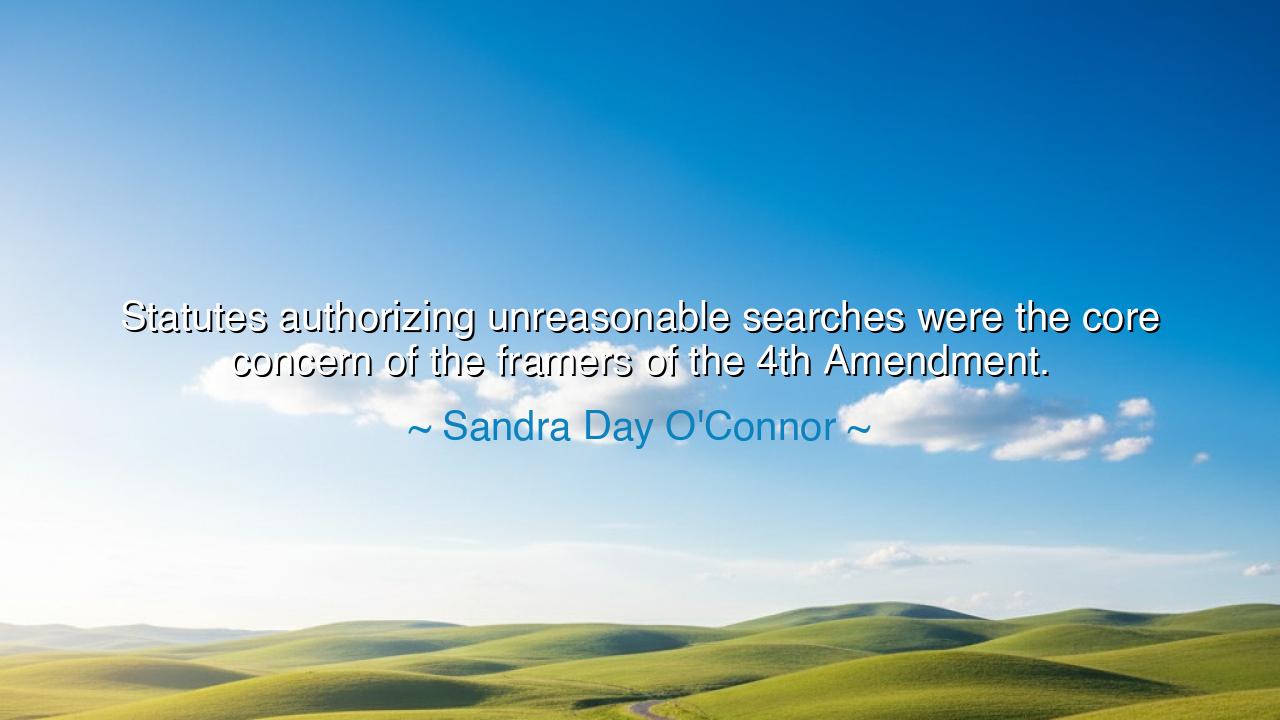
Statutes authorizing unreasonable searches were the core concern
Statutes authorizing unreasonable searches were the core concern of the framers of the 4th Amendment.






In the solemn and discerning words of Justice Sandra Day O’Connor, we hear the echo of the ancient guardians of liberty: “Statutes authorizing unreasonable searches were the core concern of the framers of the Fourth Amendment.” These words do not speak merely of legal doctrine; they speak of the sacred bond between freedom and privacy, between the citizen and the state. Justice O’Connor, the first woman to sit upon the Supreme Court, knew that every generation must remember the lessons of those who came before—that liberty, once lost to unchecked power, is not easily reclaimed. Her words are both reminder and warning: that the freedom of the individual begins at the threshold of their home and the sanctity of their conscience.
The origin of this quote lies in O’Connor’s reflections upon the Fourth Amendment to the Constitution of the United States, which protects citizens from “unreasonable searches and seizures.” This amendment was not born in abstract theory—it was born in the struggle against tyranny, forged in the anger of the American colonists who lived under the shadow of British authority. In the years before independence, the Crown’s agents carried “writs of assistance,” sweeping warrants that allowed them to search homes, businesses, and ships without cause or limitation. These laws were statutes of intrusion, granting government power over the most private corners of life. They were the embodiment of injustice—the very “unreasonable searches” that the framers would later swear to forbid for all time.
To call these statutes “the core concern” of the framers is to understand that the Fourth Amendment was not merely about property, but about dignity. The founders knew that the power to invade one’s home is the power to control one’s soul. They remembered well the words of James Otis, the fiery lawyer who, in 1761, stood before a British court and denounced the writs of assistance as “instruments of slavery.” He cried that a man’s home must be his castle—sacred, inviolable, and protected from the hand of arbitrary authority. His words ignited a revolution of thought; John Adams, who witnessed that speech, would later say it was “the spark that lit the flame of American independence.” It was from that flame that the Fourth Amendment was kindled.
Justice O’Connor, writing centuries later, carried that same flame forward. She saw in her time what the framers had seen in theirs: that every age brings new temptations for governments to reach too far, to sacrifice liberty for convenience, or privacy for security. Whether through physical searches or digital surveillance, the tools may change, but the principle remains. O’Connor’s reminder is timeless—that laws which make intrusion lawful do not make it just, and that the Constitution exists precisely to limit what law can do when power forgets restraint.
Consider the cautionary tale of the Red Scare in the early 20th century, when fear of subversion led to widespread government raids and warrantless arrests. Under the guise of protecting the nation, countless homes were entered, and citizens—many innocent—were treated as enemies. In those years, the lessons of the framers were nearly forgotten. The armor of the Fourth Amendment was cracked by panic and prejudice. And yet, in time, the courts remembered, reaffirming that the law’s highest purpose is to shield the weak from the strong, and the innocent from the suspicion of power. Justice O’Connor’s words remind us that the guardianship of freedom cannot rest solely in courts—it must live in the conscience of the people.
For what is at stake in her warning is not merely the privacy of one’s possessions, but the sovereignty of the individual spirit. When governments are permitted to look without cause, to search without restraint, to treat citizens as subjects rather than as free people, the line between liberty and tyranny fades. The framers of the Fourth Amendment understood this deeply. They did not seek to make a nation that was merely strong—they sought to make one that was righteous, where power itself would bow before justice. O’Connor’s reflection rekindles that vision, calling us to vigilance lest the freedom we inherit slip quietly from our hands.
So, my children, remember this: freedom demands boundaries, and those boundaries begin with the right to be secure in one’s own person, home, and thoughts. Do not take lightly the safeguards written into the Constitution, for they are not relics—they are the living guardians of your dignity. When you see laws or technologies that threaten privacy in the name of progress, question them. When fear whispers that liberty must yield to safety, remember that the framers faced an empire and still chose freedom. Be watchful, be wise, and above all, be worthy of the trust that liberty places in you. For as Justice O’Connor teaches, the true strength of a nation lies not in the reach of its power, but in the restraint of its hand.






AAdministratorAdministrator
Welcome, honored guests. Please leave a comment, we will respond soon